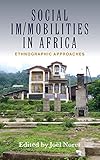Social Im/mobilities in Africa : Ethnographic Approaches / ed. by Joël Noret.
Material type: TextPublisher: New York ; Oxford : Berghahn Books, [2019]Copyright date: ©2019Description: 1 online resource (236 p.)Content type:
TextPublisher: New York ; Oxford : Berghahn Books, [2019]Copyright date: ©2019Description: 1 online resource (236 p.)Content type: - 9781789204858
- 9781789204865
- 305.5/13096 23/eng/20230216
- online - DeGruyter
| Item type | Current library | Call number | URL | Status | Notes | Barcode | |
|---|---|---|---|---|---|---|---|
 eBook
eBook
|
Biblioteca "Angelicum" Pont. Univ. S.Tommaso d'Aquino Nuvola online | online - DeGruyter (Browse shelf(Opens below)) | Online access | Not for loan (Accesso limitato) | Accesso per gli utenti autorizzati / Access for authorized users | (dgr)9781789204865 |
Frontmatter -- Contents -- Introduction: Theorizing Social Im/mobilities in Africa -- Chapter 1 Inequality from Up Close: Qur’anic Students in Northern Nigeria Working as Domestics -- Chapter 2 ‘Born Free to Aspire’? An Ethnographic Study of Rural Youths’ Aspirations in Post-Apartheid South Africa -- Chapter 3 Great Expectations and Uncertain Futures: Education and Social Im/mobility in Niamey, Niger -- Chapter 4 ‘Precarious Prosperity’? Social Im/mobilities among Young Entrepreneurs in Kampala -- Chapter 5 ‘Here Men Are Becoming Women and Women Men’ Gender, Class and Space in Maputo, Mozambique -- Chapter 6 The Dynamics of Inequality in the Congolese Copperbelt: A Discussion of Bourdieu’s Theory of Social Space -- Chapter 7 Crisis, Work and the Meanings of Mobility on the Zimbabwean-South African Border -- Chapter 8 Domestic Dramas: Class, Taste and Home Decoration in Buea, Cameroon -- Conclusion: A Multidimensional Approach to Social Positionality in Africa -- Appendices to Chapter 4 -- Appendix 1 Sample Characteristics -- Appendix 2 Summary of Entrepreneurs’ Directions of Social Mobility -- Index
restricted access online access with authorization star
http://purl.org/coar/access_right/c_16ec
Grounded in both theory and ethnography, this volume insists on taking social positionality seriously when accounting for Africa’s current age of polarizing wealth. To this end, the book advocates a multidimensional view of African societies, in which social positions consist of a variety of intersecting social powers - or ‘capitals’ – including wealth, education, social relationships, religion, ethnicity, and others. Accordingly, the notion of social im/mobilities emphasizes the complexities of current changes, taking us beyond the prism of a one-dimensional social ladder, for social moves cannot always be apprehended through the binaries of ‘gains’ and ‘losses’.
Mode of access: Internet via World Wide Web.
In English.
Description based on online resource; title from PDF title page (publisher's Web site, viewed 25. Jun 2024)


